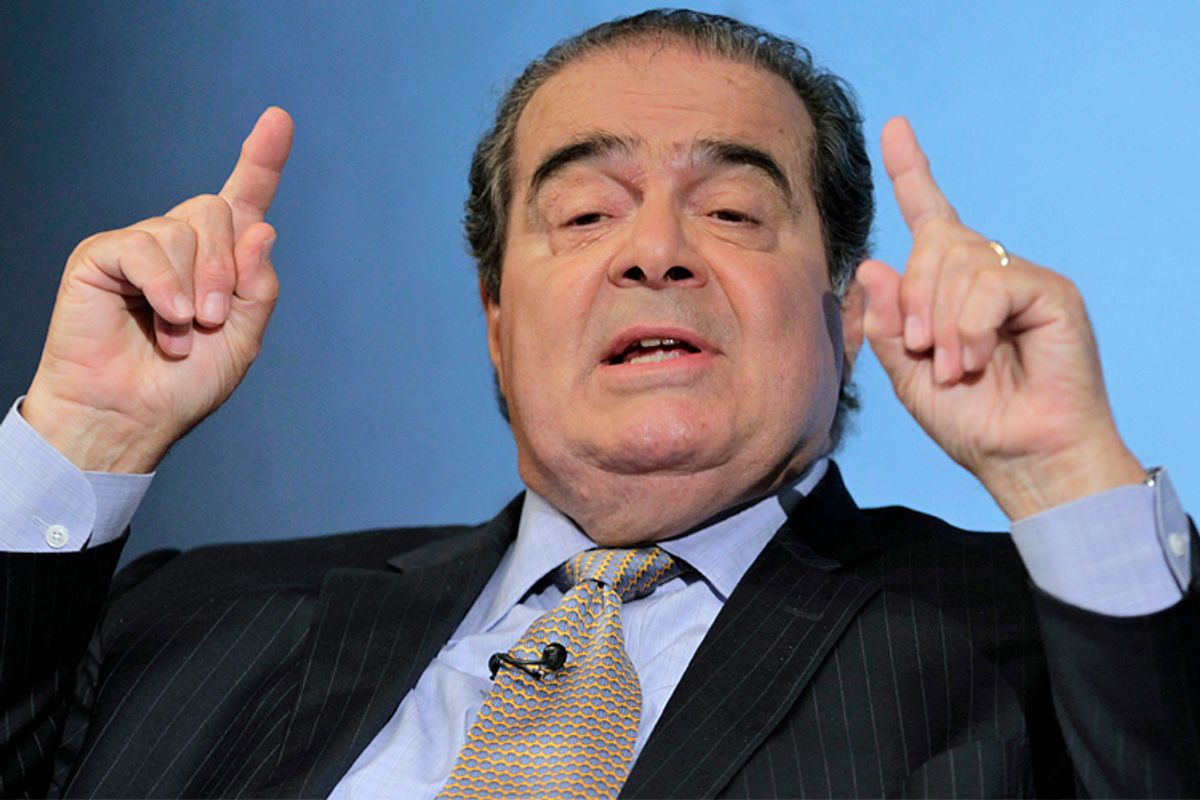This morning the Supreme Court heard arguments on a case that could change the course of the Internet and television. In the case ABC v. Aereo, television broadcasters are suing the New York based streaming company, Aereo, for copyright infringement. Aereo uses dime-sized antennas on a Brooklyn rooftop to pick up local broadcast channels and transmit them through the internet to paying subscribers.
In simple terms, Broadcasters are arguing that Aereo's streaming of local channels is a "public performance," and requires a licensing fee -- the way cable companies pay networks to broadcast their shows. Aereo is arguing that the act of renting an antenna and streaming into ones home is a private performance, akin to an individual setting up their own antenna and getting the programming to their TV. The law holds that private performances are not copyright infringement.
The nine Supreme Court justices heard these two arguments today. (Justice Alito previously recused himself but changed his mind, altering the possibility of a tie.) Though it is is nearly impossible to parse these legal minds, there were some courtroom moments worth highlighting.
Justice Scalia doesn't seem to understand that HBO does not run over the airways, but rather is a paid cable subscription. Huffington Post's Ryan Reilly first tweeted about the exchange between Scalia and Aereo attorney David Frederick. Via a courtroom transcript:
JUSTICE SCALIA: Mr. Frederick, your client is just using this for local signals --
MR. FREDERICK: Yes.
JUSTICE SCALIA: -- right now. But if we approve that, is there any reason it couldn't be used for distant signals as well?
MR. FREDERICK: Possibly.
JUSTICE SCALIA: Possibly what? There is possibly a reason, or it could possibly be used?
MR. FREDERICK: It can't be used for distance, but it implicates --
JUSTICE SCALIA: What would the difference be? I mean, you could take HBO, right? You could carry that without performing.
MR. FREDERICK: No, because HBO is not done over the airwaves. It's done through a private service.
As Business Insider pointed out, Scalia's moment of confusion highlights a fear on the Aereo side of the case: Will the justices understand the technical implications that hinge on the outcome of their decision? Depending on the parameters of the outcome, technology and future innovation are at stake -- both current and future. Doomsday scenarios would mean that broadcast networks would start charging for TV, or that cloud computing and future Internet innovations would be very limited.
More scathing -- and potentially cause for concern for Aereo -- were comments made by Chief Justice John Roberts. “Your technological model is based solely on circumventing legal prohibitions that you don’t want to comply with,” Roberts said to Frederick according to Deadline Hollywood. “There’s no reason for you to have 10,000 dime-sized antennas except to get around the Copyright Act,” he said. Deadline Hollywood also reported the Justice Ruth Bader Ginsburg also stated, ”You are the only player so far that pays no royalties whatsoever.” Rather than an innovative new business model, the justices saw it as a gimmicky go-around.
It wasn't just Aereo that was scolded by the justices, both arguments took strong hits from the court. In the transcript, Justices Breyer, Sotomayor and Kagan were very interested in the ramifications their decision could have on the cloud. During former Solicitor General Paul Clement's argument for ABC, Breyer and Sotomayor grilled him on how to draw the line between public and private performance:
"Is your definition -- I mean, Justice Breyer has already asked you -- and he's troubled by the phonograph store, and -- and the Dropbox and the iCloud. I'm also worried about how to define -- or public performance or the performance of a work publicly, which I guess is the better way to do it, according to you. How do I defined that so someone who sells coaxial cables to a resident is not swept up as a recipient in this? Or someone who -- the passive storage advisors -- this is really hard for me."
Justice Breyer summed it up best in a spar with David Fredrick, Aereo's lawyer. "The answer is very significant," he said, explaining that what "disturbs" the broadcasters is that Aereo appears to be doing what cable companies do without paying fees. On the other hand, Breyer notes that the case has a broader impact. "What disturbs me on the other side is I don't understand what the decision for you or against you when I write it is going to do to all kinds of other technologies."

Shares